Mold Remediation Services
Mold poses a significant health risk to your family. Ensure their safety by employing a professional mold remediation company at the first sign or scent of mold in your home. Protect your property and health with expert mold removal and cleanup services.
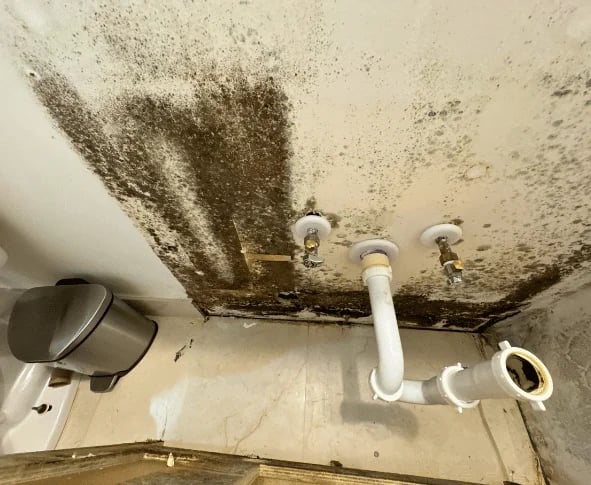
Black Mold Removal
Mold growth can occur on most common building surfaces such as sheetrock, wood, carpet, linoleum floor or on any organic material. Bathrooms, basements, areas around windows where moisture condenses, and near leaky water sources or sinks are also common mold growth areas. Growth can begin within 48 hours after the ideal moisture content has been achieved.
Mold often develops in homes due to water leaks or damage. To effectively combat mold growth, it's essential to address the underlying source of moisture, such as poor ventilation, leaking gutters, or plumbing issues. Failing to fix these root causes can lead to recurring mold and significant structural damage. Protect your family's health and your property by hiring a professional mold remediation company to handle both the mold and its moisture sources.
Mold Inspection and Removal
Mold poses a serious threat to health, making professional remediation crucial to prevent its spread throughout your home. Our expert mold inspection identifies all signs of mold using special equipment, allowing us to craft a precise removal and cleanup plan.
Opt for professional remediation to ensure mold is thoroughly and safely eliminated the first time, avoiding the risks of DIY attempts that may not address the root of the problem. Trust in our certified professionals for a mold-free environment.
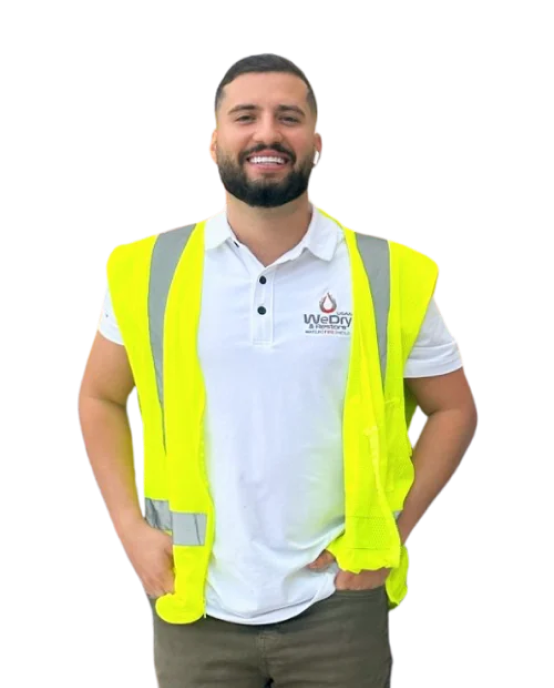
Explore our mold damage restoration jobs
Check out our mold cleanup job videos
Health Risks - 24/7 Emergency Mold Removal
Mold is a proven, serious health risk. Many families wait until mold contamination is very high before acting. Do not wait. If your home or building has had current or past water damage or leak, a mold inspection is highly advised.
Various types of mold have been medically proven to cause many health issues, which include: allergic reactions, watery, itchy eyes, a chronic cough, headaches or migraines, difficulty breathing, rashes, tiredness, sinus problems, nasal blockage and frequent sneezing.
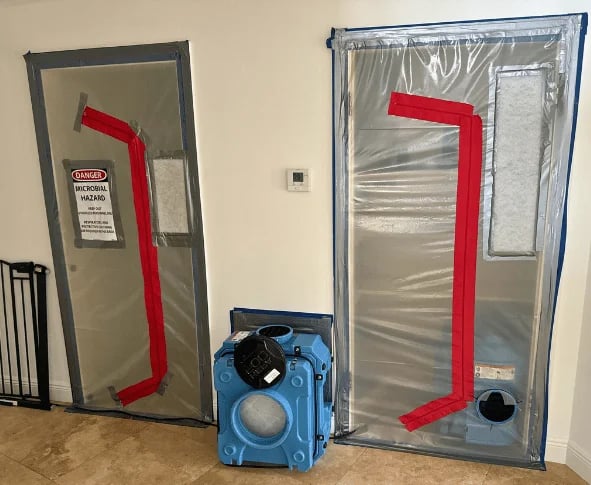
Mold Remediation Steps
- Assessment of the affected areas. A mold remediation expert evaluates your property, conducting a thorough mold inspection and moisture survey with moisture meters / thermal cameras to determine the extent and level of contamination.
- Planning a course of action with the property owner.
- Set up a containment barrier to prevent cross-contamination to unaffected areas.
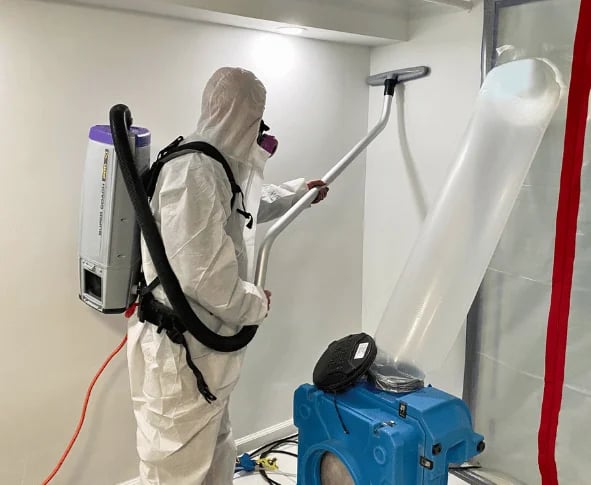
- Set up negative air machines/ air scrubbers in order to control and capture the contaminated air and produce clean and non-contaminated air.
- Set up special drying equipment such as dehumidifiers to reduce the humidity levels and dry the structure.
- Porous, mold-infected items are removed and disposed of, while non-porous items receive biocide treatment. This ensures thorough cleaning and prevents future mold growth.
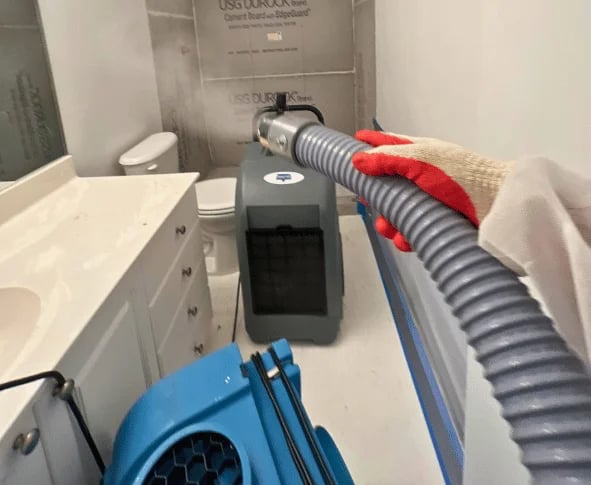
- Initially, biocide is applied to kill mold spores, followed by a deep clean using HEPA vacuums to remove all residues and prepare surfaces for protective treatments. Following this, mold fogging is implemented — a process where an antimicrobial mist is dispersed to penetrate hard-to-reach areas, ensuring thorough mold spore eradication and preventing future growth.
- Sanitizing and disinfecting of the entire containment area.
- Post-Remediation Clearance Testing
- Reconstruction and Restoration: Once cleared, reconstruction begins with new materials replacing those removed, possibly involving updates to plumbing, electrical systems, and insulation. Hiring a full-service restoration company like WeDry USA simplifies this entire process.
We Work Directly With Your Property Insurance
WeDry USA works directly with your insurance to get paid. Most property insurance policies have mold damage coverages, so our experts review your policy and work directly with your insurance to get your damage covered and paid for.
Start My Mold Removal
Please complete our contact form for prompt assistance.
We service states: Florida, New Jersey, New York, Louisiana
Please complete our contact form for prompt assistance. WeDry USA representative will respond shortly to address your needs.
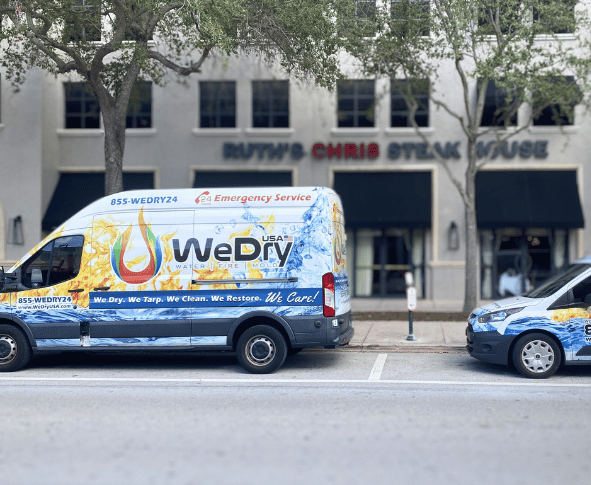
Frequently Asked Mold
Removal and Remediation Questions
What is mold remediation?
Mold remediation is a term used to encompass all the services relating to removing harmful mold. That includes testing, containment, cleaning, sanitizing and removal of mold and damaged materials.
What does mold smell like?
There is not a singular mold smell as every property is different and amounts will vary. By and large, people describe the mold smell as musty, stale and damp.
When is mold remediation necessary?
When you have mold that covers over 10 square feet of your property, it's usually time to bring in certified mold remediators.
What is the difference between mold and mildew?
Mold is a general term that covers multiple types of mold or fungus growth. Mildew is a type of mold that is common to grow in homes and buildings. Mold oftentimes looks slimy or fuzzy and is raised. Whereas mildew is powdery and usually a white or gray color.
Who pays for mold remediation? Is it covered by insurance?
Most of the time, mold damage is only covered if it's related to a covered loss. Mold damage caused by flooding would be paid for by a separate flood policy. Insurances may cover mold damage resulting from internal leaks in some cases.
How long does mold remediation take?
The time it takes to remove and remediate mold depends on the size of the property and damaged area. Most mold damage jobs are started and finished within 1-5 business days.
Can I stay home during mold removal?
Most of the time you do not need to leave your home or building during a mold remediation. A containment area is set up by certified mold remediators to control the spread of mold pores.
Black mold vs regular mold
Certain types of mold may have a fuzzy texture, but black mold will usually be slimy or wet. Early forms of black mold may be more powder-like.
